2023届高考英语语法点梳理专题:虚拟语气 课件(24张)
文档属性
| 名称 | 2023届高考英语语法点梳理专题:虚拟语气 课件(24张) | 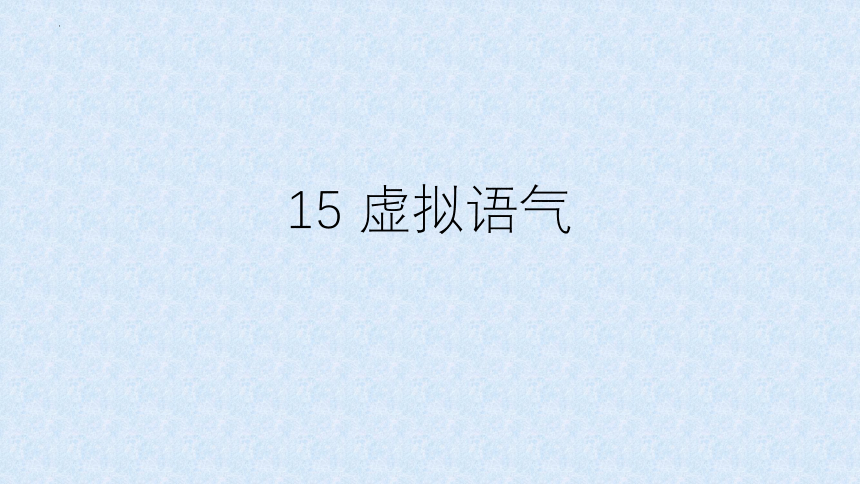 | |
| 格式 | zip | ||
| 文件大小 | 137.7KB | ||
| 资源类型 | 教案 | ||
| 版本资源 | 通用版 | ||
| 科目 | 英语 | ||
| 更新时间 | 2022-08-04 22:43:32 | ||
图片预览

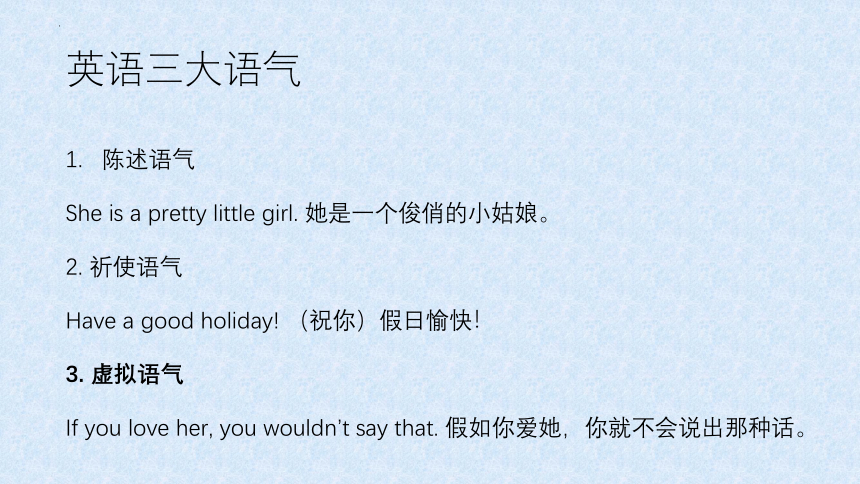
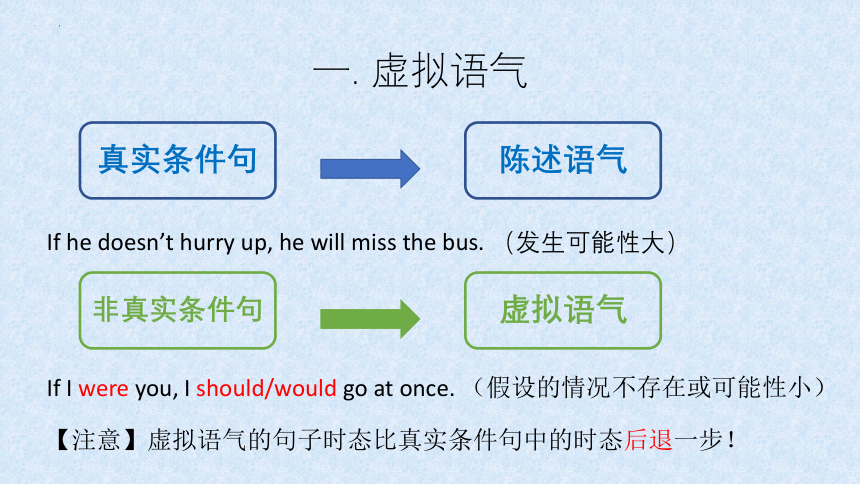
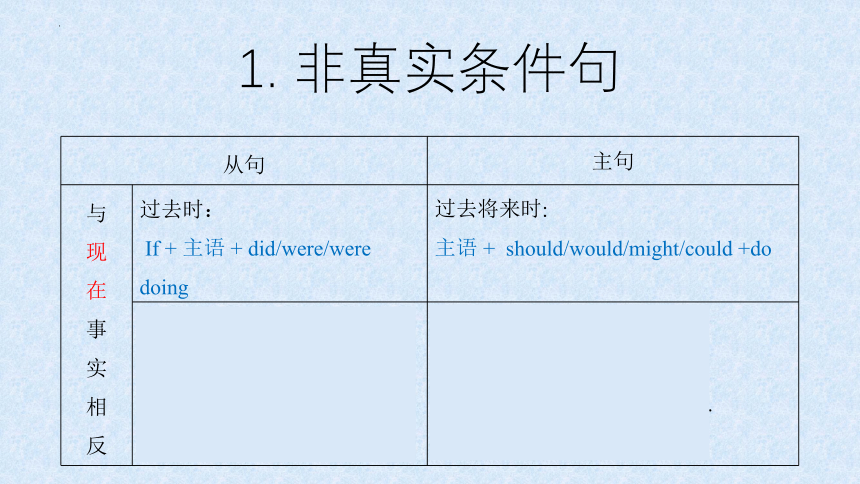
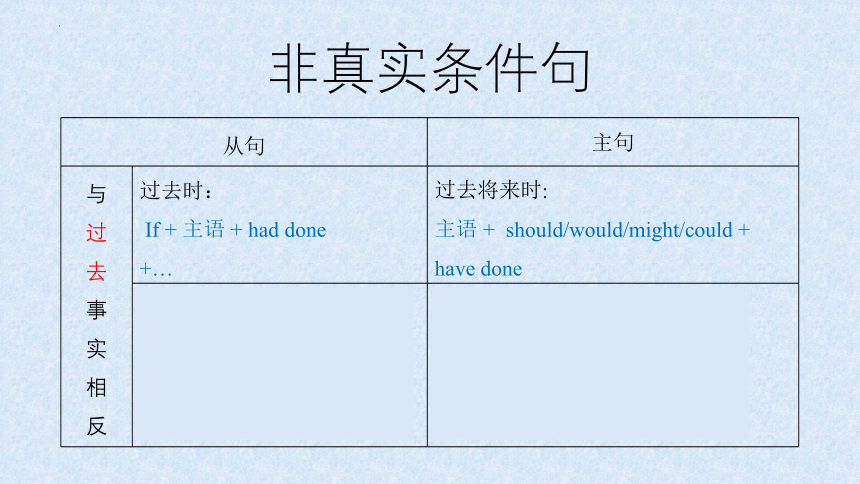
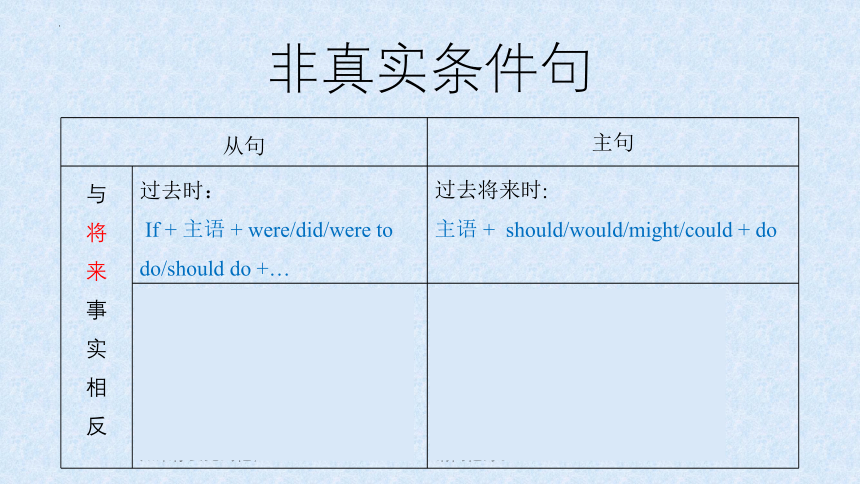
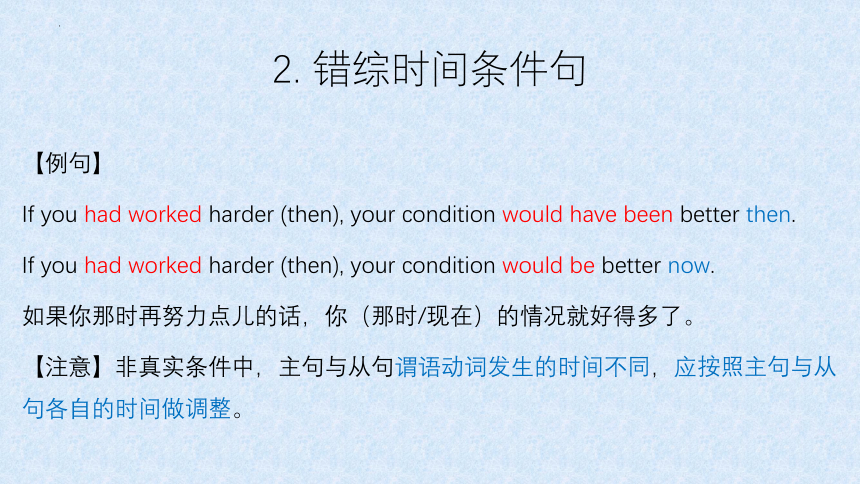
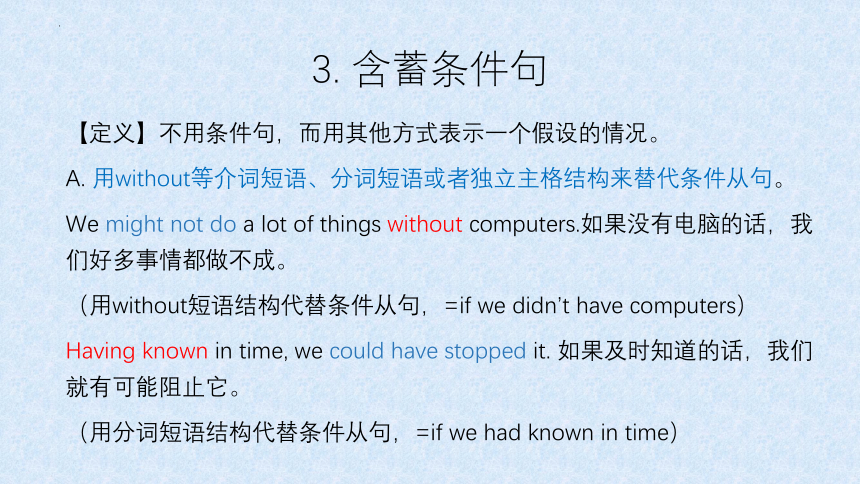
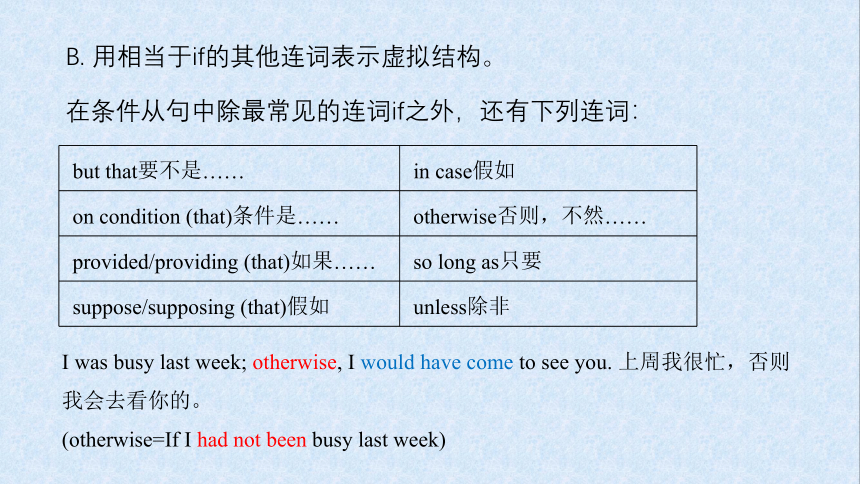
文档简介
(共24张PPT)
15 虚拟语气
英语三大语气
陈述语气
She is a pretty little girl. 她是一个俊俏的小姑娘。
2. 祈使语气
Have a good holiday! (祝你)假日愉快!
3. 虚拟语气
If you love her, you wouldn’t say that. 假如你爱她,你就不会说出那种话。
一. 虚拟语气
真实条件句
非真实条件句
陈述语气
虚拟语气
If he doesn’t hurry up, he will miss the bus. (发生可能性大)
If I were you, I should/would go at once. (假设的情况不存在或可能性小)
【注意】虚拟语气的句子时态比真实条件句中的时态后退一步!
1. 非真实条件句
从句 主句
与 现 在 事 实 相 反 过去时: If + 主语 + did/were/were doing 过去将来时:
主语 + should/would/might/could +do
If I were you, 如果我是你的话, If I had enough money, 如果我有足够的钱, I should/would go at once.
我立刻就走。
I would travel around the world.
我要到世界各地旅游。
非真实条件句
从句 主句
与 过 去 事 实 相 反 过去时: If + 主语 + had done +… 过去将来时:
主语 + should/would/might/could + have done
If he had known it, 如果他知道那件事的话, If you had got there earlier, 如果你早到一点儿的话, he would have told you.
他就告诉你了。
you would have caught the bus.
你就会赶上那辆公共汽车。
非真实条件句
从句 主句
与 将 来 事 实 相 反 过去时: If + 主语 + were/did/were to do/should do +… 过去将来时:
主语 + should/would/might/could + do
If it were Sunday tomorrow, 明天要是周日的话, If I were to see Jack, 如果我去看杰克, If you should meet him, 如果你要见到他, we wouldn’t have an exam.
我们就不参加考试了。
I should tell him about the truth.
我就告诉他实情。
you would say“hello”to him.
请问他好。
2. 错综时间条件句
【例句】
If you had worked harder (then), your condition would have been better then.
If you had worked harder (then), your condition would be better now.
如果你那时再努力点儿的话,你(那时/现在)的情况就好得多了。
【注意】非真实条件中,主句与从句谓语动词发生的时间不同,应按照主句与从句各自的时间做调整。
3. 含蓄条件句
【定义】不用条件句,而用其他方式表示一个假设的情况。
A. 用without等介词短语、分词短语或者独立主格结构来替代条件从句。
We might not do a lot of things without computers.如果没有电脑的话,我们好多事情都做不成。
(用without短语结构代替条件从句,=if we didn’t have computers)
Having known in time, we could have stopped it. 如果及时知道的话,我们就有可能阻止它。
(用分词短语结构代替条件从句,=if we had known in time)
B. 用相当于if的其他连词表示虚拟结构。
在条件从句中除最常见的连词if之外,还有下列连词:
but that要不是…… in case假如
on condition (that)条件是…… otherwise否则,不然……
provided/providing (that)如果…… so long as只要
suppose/supposing (that)假如 unless除非
I was busy last week; otherwise, I would have come to see you. 上周我很忙,否则我会去看你的。
(otherwise=If I had not been busy last week)
C.通过上下文来表示虚拟,需要具体加以分析。
I would have given you more money, but I was so poor then.
我应该再多给你些钱,可是我那时很穷。
= I was so poor then. (真实情况)
If I had had more money, I would have given you more money.
(虚拟语气,表示对过和过去事实相反的假设,原句中省略了条件从句部分)
4. 虚拟条件句中的省略与倒装
若符合下列条件,则可以省略if:
①必须是非真实条件句,真实条件句不可以省略if。
②只有当非真实条件句中有were,had,should,would等词时,才可省略if,此时主语与were,had,should,would的位置必须互换。
If I should meet her, I would tell her. 要是我见到她,我会告诉她的。
= Should I meet her, I would tell her.
Were I in your position, I would do it better. 如果我处在你的位置上,我会做得更好。
= If I were in your position, I would do it better.
二. 虚拟语气用于其他从句
在主语从句中
主句中有suggested,decided,requested,ordered,proposed,important,necessary,natural,surprising,strange,funny,a pity,a shame,an honour 等词时,主语从句用虚拟语气,谓语动词要用“should+动词原形”。
【句型】It is+suggested...+that+主语+(should)+动词原形
It is+a pity...+that+主语+(should)+动词原形
It is necessary that you (should) go there. 你有必要去那里。
It is a pity that you (should) miss a good chance. 真遗憾,你失去了这么好的机会。
【注意】上面这些句子也可以用陈述语气,只叙述事实,而不表示情绪。
2. 在宾语从句中
A.在某些特殊动词(表欲望、建议、命令等)之后的宾语从句中,需用虚拟语气。
这些特殊动词包括recommend,order,demand,request,command,propose,suggest,insist,desire等。
【句型】recommend/order/demand……+主语+(should)+动词原形
The teacher recommended that we (should) buy that reference book. 老师建议我们买那本参考书。
【重要】在这类句型中只能用should,不可以用would,could,might等别的词代替。另外,在现代英语中,should常被省略。
suggest有两种意思:
(1)当“建议”解时,后面的宾语从句用虚拟语气;
He suggests that she (should) leave at once.他建议她立刻离开。
(2)当“暗示”,“略微透露”,“表明”解时,后面的宾语从句不用虚拟语气。
His face suggested that he was angry.他的脸色表明他生气了。
insist也有两种意思:
(1)当“坚决要求”解时,后面的宾语从句要用虚拟语气;
He insisted that I (should) stay for lunch.他坚持要求我留下吃午饭。
(2)当“坚持说”解时,后面的宾语从句不用虚拟语气。
He insisted that he was innocent.他坚持说他是无辜的。
B. wish后的宾语从句需要用虚拟语气,时态后移。
a.与现在事实相反的愿望,用过去时。
句型:主语+wish+从句(主语+did/was/were……)
I wish I were as young as you. 真希望我能和你一样年轻。
【注意】wish to do和wish sb. to do属于不定式的句型,不是虚拟。
b.与过去事实相反的愿望,用过去完成时。
句型:主语+wish+从句(主语+had done……)
I wish I had been here last night. 我要是昨晚在这儿就好了。
c.与将来的愿望相反,即愿望难以实现,用过去将来时。
句型:主语+wish+从句(主语+would do……)
How she wishes her eyes would see again! 她多么希望双眼能重见光明啊!
【比较】wish和hope
1. wish+从句,表示的是不可能实现的愿望,从句必须用虚拟语气。
He wishes his son would win the competition.
他多么希望他的儿子在竞赛中能够获胜啊!(可惜获胜不了)
2. hope+从句,表示的是有可能实现的事实,从句不能用虚拟语气。
He hopes that his son will win the competition.
他希望他儿子在竞赛中能够获胜。(有可能获胜)
3. 在表语从句和同位语从句中的用法
主句中有suggestion,proposal,order,insistence,plan,idea等词时,表语从句或同位语从句用虚拟语气,谓语动词要用“should+动词原形”。
【句型】
表语从句: My suggestion is that we (should) do he experiment again. 我的建议是再做一次实验。
同位语从句:My suggestion that we (should) do the experiment again is accepted by them.
我提出的再做一次实验的建议被他们所接纳。
【补充】和主语从句一样,如果不表示建议、命令、愿望等情绪,表语从句同位语从句中也可不用虚拟语气,而用陈述语气。
4. 在定语从句中的用法
【句型】
It is/was (high) time that+主语+should+动词原形
It is/was (high) time that+主语+动词过过去式
It is/was (high) time for +主语+动词不定式
It is/was (high) time for + 名词
例句:It is time that you should have a class. 时候该上课了。
= It is time that you had a class.
= It is time for you to have a class.
= It is time for class.
5. 在状语从句中的用法
1.在目的状语从句中的虚拟语气
【句型】that/in order that/so that+主语+may/might+动词原形,意为“为了……,以便……”,表肯定目的。
They got up early in order that/so that they could/might catch the train. 他们早起,这样就能赶上火车。
说明:在目的状语从句中,用may/might比较正式,但也可用can/could,will/would,should,在口语中尤其以can/could最为常用。此外,may/might也有时态上的差异。
【句型】lest+主语+should+动词原形,意为“为了不……,以免……”,表否定目的。
lest引导的状语从句可以换成that,so that,in order that。此时,从句应用否定形式。
The Simpsons got up early lest they (should) miss the train. 辛普森一家人起得很早,以免误了火车。
=The Simpsons got up early that/so that/in order that they might no miss the train.
2. 在原因状语从句中的虚拟语气
【句型】
(1)主语 + be sorry/surprised/disappointed + that + 主语 + should do 表现在或将来
I am sorry that he should fail in the exam again.我真难过,他这次考试竟然又没通过。
(2)主语 + be sorry/surprised/disappointed + that + 主语 + should have done 表过去
I am sorry that things should have come to this.我很抱歉事情竟落到这般地步。
【注意】在引起失望、难过、惊奇等感情的原因状语从句中用虚拟语气,句中的should作“竟然,居然”解(在美国英语中should常省略)。如果只是陈述一件事情,可以用陈述语气而不用虚拟语气。
3. 作方式状语从句中的虚拟语气
在as if,as though引导的从句中,如果谈论的是不可能或不真实的情况时,要用虚拟语气。
He speaks English as if he were/was an Englishman.(与现在事实相反)
他说起英语来好像他是个英国人似的。
They talked about the city as if/as though they had been there before.(与过去事实相反)
他们谈论那座城市就好像他们以前真去过那儿似的。
He stood up as if/as though he would speak.(与将来事实相反)他站起来好像要发言似的。
主句 连词 状语从句 虚拟语气
主语+动词 + as if/as though 过去式或were + 主语 + 过去完成式 would/could+动词原形 表现在(与现在事实相反)
表过去(与过去事实相反)
表将来(与将来事实相反)
【比较】as if,as though,seem,appear都表示“好像”的意思,但seem和appear是叙述事实或近乎事实,要用陈述语气。as if和as though是指好像是,但事实上不是,要用虚拟语气。
He seems/appears (to be) honest.=It seems/appears that he is honest. 他好像很诚实。
【补充】当as if,as though之前为It seems/appears/looks/sounds/smells等时,它们引导的从句有时依句意需要也可用陈述语气,表示说话者认为有可能是事实的事。
There are clouds in the sky, it looks as if it is going to rain.(说话者认为会下雨。)
4. 在would rather引导的从句中的虚拟语气
I would rather you stayed at home now. 你要是现在留在家里就好了。
(与现在事实相反)
I would rather you had gone there. 你要是去那里就好了。
(与过去事实相反)
主语A+would rather (that)+主语B+ (主语A与主语B主语不同) did(表现在或将来,与现在或将来事实相反)
had done(表过去,与过去事实相反)
Quiz
1. A: It looks as if he were drunk. B: So it does.__________.
A. He’d better give up drinking B. He shouldn’t have drunk so much
C. Health is more important than drink D. I wonder why he is always doing so
2. All the doctors in the hospital insisted that he __________ badly wounded and that he __________ at once.
A. should be; be operated on B. were; must be operated on
C. was; should be operated D. was; be operated on
3. __________ smoking, he would not have got cancer in the lung.
A. Was he given up B. Had he given up
C. Did he give D. If he gave up
D
D
B
15 虚拟语气
英语三大语气
陈述语气
She is a pretty little girl. 她是一个俊俏的小姑娘。
2. 祈使语气
Have a good holiday! (祝你)假日愉快!
3. 虚拟语气
If you love her, you wouldn’t say that. 假如你爱她,你就不会说出那种话。
一. 虚拟语气
真实条件句
非真实条件句
陈述语气
虚拟语气
If he doesn’t hurry up, he will miss the bus. (发生可能性大)
If I were you, I should/would go at once. (假设的情况不存在或可能性小)
【注意】虚拟语气的句子时态比真实条件句中的时态后退一步!
1. 非真实条件句
从句 主句
与 现 在 事 实 相 反 过去时: If + 主语 + did/were/were doing 过去将来时:
主语 + should/would/might/could +do
If I were you, 如果我是你的话, If I had enough money, 如果我有足够的钱, I should/would go at once.
我立刻就走。
I would travel around the world.
我要到世界各地旅游。
非真实条件句
从句 主句
与 过 去 事 实 相 反 过去时: If + 主语 + had done +… 过去将来时:
主语 + should/would/might/could + have done
If he had known it, 如果他知道那件事的话, If you had got there earlier, 如果你早到一点儿的话, he would have told you.
他就告诉你了。
you would have caught the bus.
你就会赶上那辆公共汽车。
非真实条件句
从句 主句
与 将 来 事 实 相 反 过去时: If + 主语 + were/did/were to do/should do +… 过去将来时:
主语 + should/would/might/could + do
If it were Sunday tomorrow, 明天要是周日的话, If I were to see Jack, 如果我去看杰克, If you should meet him, 如果你要见到他, we wouldn’t have an exam.
我们就不参加考试了。
I should tell him about the truth.
我就告诉他实情。
you would say“hello”to him.
请问他好。
2. 错综时间条件句
【例句】
If you had worked harder (then), your condition would have been better then.
If you had worked harder (then), your condition would be better now.
如果你那时再努力点儿的话,你(那时/现在)的情况就好得多了。
【注意】非真实条件中,主句与从句谓语动词发生的时间不同,应按照主句与从句各自的时间做调整。
3. 含蓄条件句
【定义】不用条件句,而用其他方式表示一个假设的情况。
A. 用without等介词短语、分词短语或者独立主格结构来替代条件从句。
We might not do a lot of things without computers.如果没有电脑的话,我们好多事情都做不成。
(用without短语结构代替条件从句,=if we didn’t have computers)
Having known in time, we could have stopped it. 如果及时知道的话,我们就有可能阻止它。
(用分词短语结构代替条件从句,=if we had known in time)
B. 用相当于if的其他连词表示虚拟结构。
在条件从句中除最常见的连词if之外,还有下列连词:
but that要不是…… in case假如
on condition (that)条件是…… otherwise否则,不然……
provided/providing (that)如果…… so long as只要
suppose/supposing (that)假如 unless除非
I was busy last week; otherwise, I would have come to see you. 上周我很忙,否则我会去看你的。
(otherwise=If I had not been busy last week)
C.通过上下文来表示虚拟,需要具体加以分析。
I would have given you more money, but I was so poor then.
我应该再多给你些钱,可是我那时很穷。
= I was so poor then. (真实情况)
If I had had more money, I would have given you more money.
(虚拟语气,表示对过和过去事实相反的假设,原句中省略了条件从句部分)
4. 虚拟条件句中的省略与倒装
若符合下列条件,则可以省略if:
①必须是非真实条件句,真实条件句不可以省略if。
②只有当非真实条件句中有were,had,should,would等词时,才可省略if,此时主语与were,had,should,would的位置必须互换。
If I should meet her, I would tell her. 要是我见到她,我会告诉她的。
= Should I meet her, I would tell her.
Were I in your position, I would do it better. 如果我处在你的位置上,我会做得更好。
= If I were in your position, I would do it better.
二. 虚拟语气用于其他从句
在主语从句中
主句中有suggested,decided,requested,ordered,proposed,important,necessary,natural,surprising,strange,funny,a pity,a shame,an honour 等词时,主语从句用虚拟语气,谓语动词要用“should+动词原形”。
【句型】It is+suggested...+that+主语+(should)+动词原形
It is+a pity...+that+主语+(should)+动词原形
It is necessary that you (should) go there. 你有必要去那里。
It is a pity that you (should) miss a good chance. 真遗憾,你失去了这么好的机会。
【注意】上面这些句子也可以用陈述语气,只叙述事实,而不表示情绪。
2. 在宾语从句中
A.在某些特殊动词(表欲望、建议、命令等)之后的宾语从句中,需用虚拟语气。
这些特殊动词包括recommend,order,demand,request,command,propose,suggest,insist,desire等。
【句型】recommend/order/demand……+主语+(should)+动词原形
The teacher recommended that we (should) buy that reference book. 老师建议我们买那本参考书。
【重要】在这类句型中只能用should,不可以用would,could,might等别的词代替。另外,在现代英语中,should常被省略。
suggest有两种意思:
(1)当“建议”解时,后面的宾语从句用虚拟语气;
He suggests that she (should) leave at once.他建议她立刻离开。
(2)当“暗示”,“略微透露”,“表明”解时,后面的宾语从句不用虚拟语气。
His face suggested that he was angry.他的脸色表明他生气了。
insist也有两种意思:
(1)当“坚决要求”解时,后面的宾语从句要用虚拟语气;
He insisted that I (should) stay for lunch.他坚持要求我留下吃午饭。
(2)当“坚持说”解时,后面的宾语从句不用虚拟语气。
He insisted that he was innocent.他坚持说他是无辜的。
B. wish后的宾语从句需要用虚拟语气,时态后移。
a.与现在事实相反的愿望,用过去时。
句型:主语+wish+从句(主语+did/was/were……)
I wish I were as young as you. 真希望我能和你一样年轻。
【注意】wish to do和wish sb. to do属于不定式的句型,不是虚拟。
b.与过去事实相反的愿望,用过去完成时。
句型:主语+wish+从句(主语+had done……)
I wish I had been here last night. 我要是昨晚在这儿就好了。
c.与将来的愿望相反,即愿望难以实现,用过去将来时。
句型:主语+wish+从句(主语+would do……)
How she wishes her eyes would see again! 她多么希望双眼能重见光明啊!
【比较】wish和hope
1. wish+从句,表示的是不可能实现的愿望,从句必须用虚拟语气。
He wishes his son would win the competition.
他多么希望他的儿子在竞赛中能够获胜啊!(可惜获胜不了)
2. hope+从句,表示的是有可能实现的事实,从句不能用虚拟语气。
He hopes that his son will win the competition.
他希望他儿子在竞赛中能够获胜。(有可能获胜)
3. 在表语从句和同位语从句中的用法
主句中有suggestion,proposal,order,insistence,plan,idea等词时,表语从句或同位语从句用虚拟语气,谓语动词要用“should+动词原形”。
【句型】
表语从句: My suggestion is that we (should) do he experiment again. 我的建议是再做一次实验。
同位语从句:My suggestion that we (should) do the experiment again is accepted by them.
我提出的再做一次实验的建议被他们所接纳。
【补充】和主语从句一样,如果不表示建议、命令、愿望等情绪,表语从句同位语从句中也可不用虚拟语气,而用陈述语气。
4. 在定语从句中的用法
【句型】
It is/was (high) time that+主语+should+动词原形
It is/was (high) time that+主语+动词过过去式
It is/was (high) time for +主语+动词不定式
It is/was (high) time for + 名词
例句:It is time that you should have a class. 时候该上课了。
= It is time that you had a class.
= It is time for you to have a class.
= It is time for class.
5. 在状语从句中的用法
1.在目的状语从句中的虚拟语气
【句型】that/in order that/so that+主语+may/might+动词原形,意为“为了……,以便……”,表肯定目的。
They got up early in order that/so that they could/might catch the train. 他们早起,这样就能赶上火车。
说明:在目的状语从句中,用may/might比较正式,但也可用can/could,will/would,should,在口语中尤其以can/could最为常用。此外,may/might也有时态上的差异。
【句型】lest+主语+should+动词原形,意为“为了不……,以免……”,表否定目的。
lest引导的状语从句可以换成that,so that,in order that。此时,从句应用否定形式。
The Simpsons got up early lest they (should) miss the train. 辛普森一家人起得很早,以免误了火车。
=The Simpsons got up early that/so that/in order that they might no miss the train.
2. 在原因状语从句中的虚拟语气
【句型】
(1)主语 + be sorry/surprised/disappointed + that + 主语 + should do 表现在或将来
I am sorry that he should fail in the exam again.我真难过,他这次考试竟然又没通过。
(2)主语 + be sorry/surprised/disappointed + that + 主语 + should have done 表过去
I am sorry that things should have come to this.我很抱歉事情竟落到这般地步。
【注意】在引起失望、难过、惊奇等感情的原因状语从句中用虚拟语气,句中的should作“竟然,居然”解(在美国英语中should常省略)。如果只是陈述一件事情,可以用陈述语气而不用虚拟语气。
3. 作方式状语从句中的虚拟语气
在as if,as though引导的从句中,如果谈论的是不可能或不真实的情况时,要用虚拟语气。
He speaks English as if he were/was an Englishman.(与现在事实相反)
他说起英语来好像他是个英国人似的。
They talked about the city as if/as though they had been there before.(与过去事实相反)
他们谈论那座城市就好像他们以前真去过那儿似的。
He stood up as if/as though he would speak.(与将来事实相反)他站起来好像要发言似的。
主句 连词 状语从句 虚拟语气
主语+动词 + as if/as though 过去式或were + 主语 + 过去完成式 would/could+动词原形 表现在(与现在事实相反)
表过去(与过去事实相反)
表将来(与将来事实相反)
【比较】as if,as though,seem,appear都表示“好像”的意思,但seem和appear是叙述事实或近乎事实,要用陈述语气。as if和as though是指好像是,但事实上不是,要用虚拟语气。
He seems/appears (to be) honest.=It seems/appears that he is honest. 他好像很诚实。
【补充】当as if,as though之前为It seems/appears/looks/sounds/smells等时,它们引导的从句有时依句意需要也可用陈述语气,表示说话者认为有可能是事实的事。
There are clouds in the sky, it looks as if it is going to rain.(说话者认为会下雨。)
4. 在would rather引导的从句中的虚拟语气
I would rather you stayed at home now. 你要是现在留在家里就好了。
(与现在事实相反)
I would rather you had gone there. 你要是去那里就好了。
(与过去事实相反)
主语A+would rather (that)+主语B+ (主语A与主语B主语不同) did(表现在或将来,与现在或将来事实相反)
had done(表过去,与过去事实相反)
Quiz
1. A: It looks as if he were drunk. B: So it does.__________.
A. He’d better give up drinking B. He shouldn’t have drunk so much
C. Health is more important than drink D. I wonder why he is always doing so
2. All the doctors in the hospital insisted that he __________ badly wounded and that he __________ at once.
A. should be; be operated on B. were; must be operated on
C. was; should be operated D. was; be operated on
3. __________ smoking, he would not have got cancer in the lung.
A. Was he given up B. Had he given up
C. Did he give D. If he gave up
D
D
B
